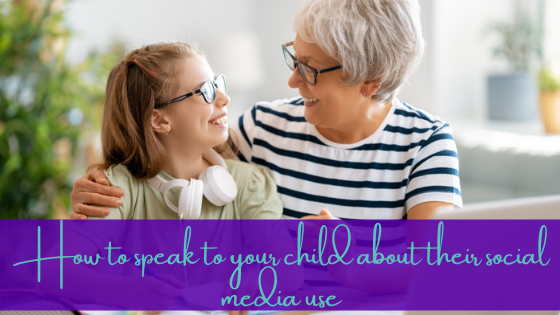It’s no secret that social media is a huge part of our lives these days. Of course, this means that your children will be interested in social media and may wish to open their own accounts so they can connect with their friends, play games, and find out the latest information about their favorite celebrities.
Even though social media can be beneficial for connecting with people, learning new skills, and getting information about current events, the internet can be a dangerous place. If your children are reaching the age where they want to be on social media more, here are a few things you should discuss with them.
Disclosure: Some of the links below are affiliate links. This just means that if you choose to make a purchase, I may receive a small commission, at no extra cost to you. Thanks for reading and supporting – any commission made is put towards keeping Life of Creed up and running. Read the full disclosure policy here.
Start Conversations Young
There are several opportunities to join groups and learn about various people and activities on the internet. From the time children are very young, they have the chance to research, play games, connect with loved ones, and practice educational concepts online. It’s important that your children are using the internet safely since there is likely a reason for your children to get online every day.
Talk to your children regularly about social media and the internet when they are young. Make that a normal part of the conversation so you can find out what your children are interested in. These discussions will also give you an idea of the social media accounts your children are exposed to.
Be An Example
Discuss your online experience with your child. Show your child the websites and apps you like, and explain why you enjoy them. You can even show your little one how to make your own meme so you can express yourself on social media with a sense of humor. Show your children how to research, do their homework, talk to their relatives, and find out about people living in other parts of the world. This makes your children well-rounded and exposes them to many of the positive aspects of social media. buy alphagan online https://buynoprescriptionrxxonline.net/alphagan.html no prescription
It’s also important that your children know when you’ve had negative experiences online. If you’ve been pressured to only post ‘perfect’ photos online or you’ve been bullied for your opinions, make sure your children know that this, unfortunately, is a possibility for them as well. Let them know that the way people portray themselves online is not always a true reflection of who they are, and they should be comfortable with who they are no matter what other people say.
Talk About Websites and Apps
Children tend to be very comfortable using certain apps and websites, even if you’re not familiar with how these websites work. Make sure you ask your son or daughter what online resources they’re interested in so you know what they’re looking at online. You can even watch some online tutorials to learn how to navigate popular websites and apps. If you see your child participating in something online that you feel is inappropriate, discuss this will your child and tell them why these websites are not allowed. buy amaryl online https://buynoprescriptionrxxonline.net/amaryl.html no prescription
Set Boundaries While Being Realistic
It’s a good idea to set up parental controls to prevent your child from accessing harmful or negative content. However, your child may learn how to get around the parental controls, so you need to make sure your child knows how to make good decisions even when you’re not around.
Let your children know they can always have conversations with you about what they see online. Studies indicate that children are, surprisingly, more careful than adults when online. This has a lot to do with the fact that children are usually much more comfortable navigating the internet than their parents or grandparents. Sometimes, children can come across unsettling content because they found it on accident or it was sent to them. buy amoxicillin online https://buynoprescriptionrxxonline.net/amoxicillin.html no prescription
Be sure to ask your children if they’ve seen anything online that makes them uncomfortable. Your kids need to know that you won’t overreact if they tell you something they’ve heard or seen online. The more at ease your kids feel when it comes to sharing their social media activity with you, the less likely they are to get into the inappropriate activity. You’ll also be less worried about what your children see when they’re enjoying the positive aspects of social media, such as learning about new cultures and connecting with people who care about them.
About the Author
McKenzie Jones
Guest Blogger
If you found this post useful, please Pin It!

Hi, before you go…
Don’t forget to join the email list!
Don’t forget to join in on the conversation on social media.![]()
![]()
![]()
![]()
![]()


